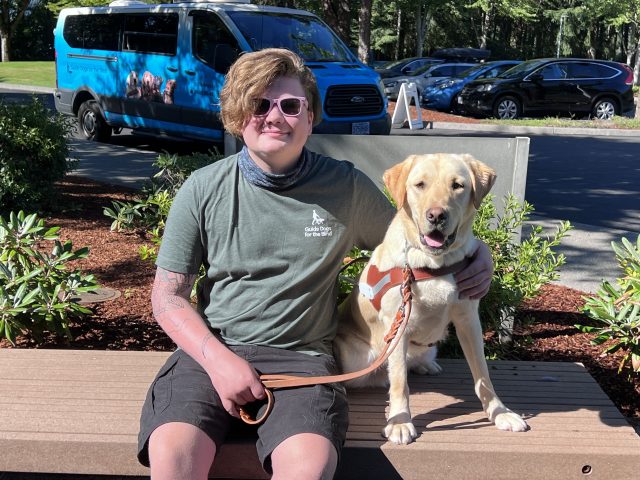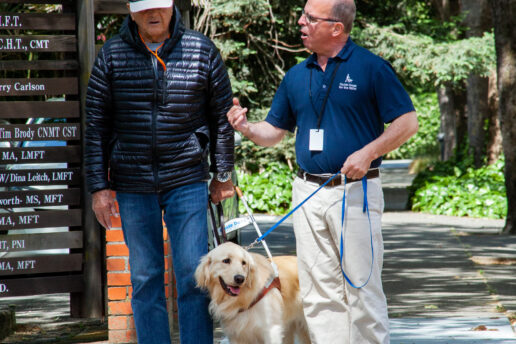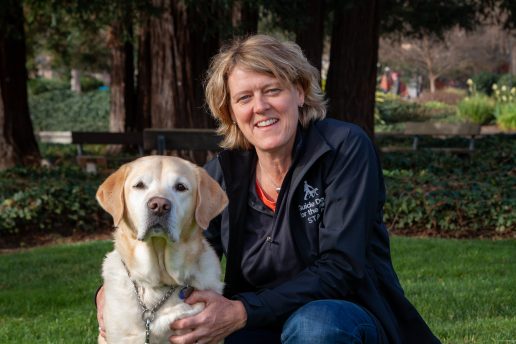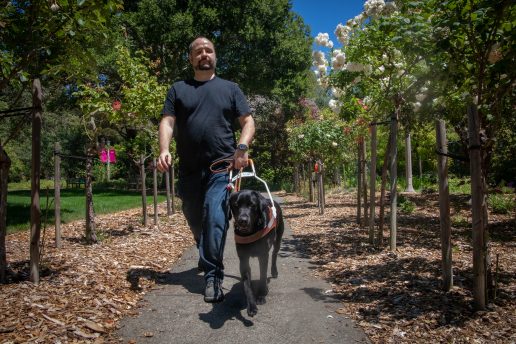
Central Bark Episode 21
Careers & Canine Connections
Theresa sits down with GDB Youth Outreach Specialist, Jane Flower, and Richard Rueda from APH CareerConnect to discuss our upcoming collaborative project: Careers & Canine Connections. Geared toward young adults ages 18-24, this FREE week-long workshop will be equal parts fun and future-focused to help prepare attendees who are blind or visually impaired to enter the workforce with confidence and an understanding of how a guide dog might fit into that plan.
Theresa Stern: Today, I am joined by two guests. We have Jane Flower, who is our Youth Outreach Specialist here at Guide Dogs for the Blind, and Richard Rueda, who works for APH in the Career Connect. And we are so excited at Guide Dogs for the Blind, because we are partnering this year with Career Connect and APH to bring you Careers and Canine Connections, a new program for young adults. So, let's kick it off and learn more about both of these amazing folks and about their programs.
Theresa Stern: Richard, let's start with you. Tell us a little bit about yourself, and about APH and Career Connect, and all that good stuff.
Richard Rueda: Well, Teresa and Jane, thank you so much for having me on the program. Yes, my name is Richard Rueda and I do work as the content manager or digital content manager for APH, which is the American Printing House for the Blind. Our division is called the APH Connect Center. And within the Connect Center we have several programs, one of which is Career Connect, a program for, essentially it's a website where we provide resources for curious job seekers, young high school students, young adults, and adults. It's been around for over 30 years and it provides tons of resources, webinars, career conversations where we interview working blind adults.
We have toolkits on how to get a job, our job seekers toolkit. We have a transition hub on how to identify summer programs such as the one that we will be talking about that are available to youth and young adults who are seeking assistance on getting ready for life after high school, getting ready for their first job, getting ready for college. Career Connect is so much, and one of the things we are doing this year and in 2023 is really partnering with agencies such as Guide Dogs to launch Careers and Canine Connections, which I'm super excited about.
Theresa Stern: That's awesome. And Jane, you were on several months ago. What's up and what's new with you? And can you tell us a little bit about this partnership and the goal of the program?
Jane Flower: Yeah, thank you. Thanks, Theresa. And hey, Richard. So nice to see you. And just a fun fact. Richard, Teresa and I all known each other since we were little kids growing up in Southern California. So, it's so fun now to come together as adults. We're adults, and work. So, really excited to be working with the APH Career Connect program to develop this essentially a week long summer program for youth ages 18 to 24 who are, like Richard said, curious job seekers really wanting to work and have a job and a career as they grow up, and also possibly really wanting to use a guide dog for mobility, and how those two things might come together and work together once they get out into the working world. So, we're really excited about the partnership and launching this next summer of 2023. It's going to come sooner than we know it.
Theresa Stern: Yeah, no kidding. Oh, my gosh. Wouldn't it have been cool if they had this program when we were all kids. That would be so much fun.
Jane Flower: Yes.
Richard Rueda: I always say that there were so many fun things like going to the beach and learning how to roller skate, but never how to balance a checkbook or find a job.
Theresa Stern: Yeah. No, totally. So that as we're adults, we can pay for all the fun stuff.
Jane Flower: Right. Yeah. I mean, fortunately the attitude has taken a huge shift in realizing in the blindness community that we can work and we can be contributing members of society. So, we need to help all these kids realize that themselves and their potential and help them grow up and hold down jobs. They don't have to just work in call centers and things like that the way it used to be. So, it's really exciting to be a part of this.
Theresa Stern: Yeah. I love that, finding your potential and all the things that you can do, all the possibilities. I think that you're right. I think growing up with a visual impairment, sometimes people don't expect that much of you, so you don't expect that much of yourself. So, having I think these opportunities to learn what's possible is really great. So, Richard and Jane, can you tell me a little bit about the program and how it's going to work, and who you're targeting to come and what the program will be like?
Jane Flower: Yeah. Do you want me to start, Richard. Do you want to start?
Richard Rueda: Go ahead, Jane, and then I'll wrap around.
Jane Flower: Okay. Yeah, sure. Well, just to give you guys the dates, whoever's listening, the dates are going to be August 7th through August 12th, and we're going to be holding this up where we hold our summer camp GDB program at the Hull Park and Learning Center in Sandy, Oregon near our Guide Dogs for the Blind Campus in Oregon. And our target age is 18 to 24. And it is a week long of learning, a deep dive into all things careers and all things guide dogs. And I'll speak to the Guide dog piece and I'll let Richard speak to the career piece. And we're hoping to link the two types of conversations we're going to be having with the kids. So, things that Richard's speaking about in terms of careers, we're hoping to jump in and how is that going to look with a guide dog, and all the things that go along with living and working with a guide dog.
Not only working the dog, but having a job and working. And so, we are going to spend some time on the Guide Dogs for the Blind campus. They're going to get to experience a dog walk, and they'll also get a guide dog overnight experience. It won't be working. It'll just be having a dog in a 24-hour period, and learning all that go along and with just taking care of a dog. Because that's a lot to do when you're also trying to take care of yourself and get ready for work. So, all of these cool things that need to take place. And then we're also, I'll just speak to this piece just because it's what we're going to have the kids meet with a Guide Dogs for the Blind staff member in a whatever department, we haven't decided all the employees we're going to use yet, but do an informational interview about their job. What's their job like?
How did they get into their career? Because we've got a wide variety of jobs here at Guide Dogs for the Blind. Not just working with dogs, but we've got all kinds of administration roles and things. So, really want them to maybe interview somebody, not necessarily even in a job they might think they want, exploring. Maybe interview a job that you didn't even think about and learn about that position and what kinds of schooling they might have had and what their day-to-day work is like. That will be part of our day spent at Guide Dogs for the Blind campus as well. Because we're spending a week together, we have to have a little fun too.
Theresa Stern: Absolutely.
Richard Rueda: Yeah.
Jane Flower: So, there'll be campfires, hopefully a fun hike. And we have some other things planned as well. So, yeah, we're excited.
Theresa Stern: You can't give away all the surprises.
Jane Flower: No.
Theresa Stern: All right. Richard, tell us a little bit about the career portion.
Richard Rueda: Yeah. So, thinking back to all the fun things we do in the summer and really fusing in all the things we learn about guide dogs. And it was really cool to be there last summer for a brief period, for about one day, just to get a sense of how it worked and talk about Career Connect. And I think that's what this event grew out of that visit is we can do more with our young adults who are career curious and maybe don't know where to go, and they're also exploring the Guide Dog angle. So, why not bring together the best of both worlds and introduce concepts on career exploration. How do I get a job? How do I interview for a job? Again, all these resources we know about, we learned either by accident or just by incidentally, but now that it's all packaged under the Career Connect umbrella, we have so much really cool curriculum that we can share with the students.
And in 30, 40 1-hour sessions throughout the week talking about how was I successful, where did I fail at? And having persons like Theresa, Jane, and myself, and others who are blind and low vision on campus with the students, you have adult role models who are going to be with you. So, you're living it. And they get to experience through us what our stories are. And talking about what does it take to be successful? How do you settle your guide dog in the workplace? How do you travel with a guide dog? How do you interview for a job? How do you disclose your vision loss? And how do you integrate your guide dog into a workplace and settle the curiosity or the uncertainty of the employer who's not sure if a dog is going to be okay in the workplace. So, we talk about all those in real conversations, maybe around the campfire, maybe in a circle.
We're doing some kind of a trust activity. We're talking about all these things that are important that maybe students haven't had that complete 24 hour enrichment until now. So, it's a deep dive, as Jane has said. But again, we make it very interesting. We make it very informative and we make it very fun. And I think that's how you build confidence. They learn from us. They learn from each other. And it's going to be an outstanding week. And we talk about the realities of being underemployed and unemployed, with the rate being of over 70%. You don't candy code it because we want it to be real. We want it to be tangible, and we want you to be successful.
Theresa Stern: Awesome. That's awesome. I also love the part where you're bringing, you're connecting all these folks coming to the program that are coming from different parts of the country, that maybe don't know other folks who are visually impaired. So, Jane, do you want to talk a little bit about some of the connection that comes along there? So, we've got our careers, we've got our canines. Tell us a little bit about special connections.
Jane Flower: Yeah. I mean, that's probably one of the most invaluable pieces that come out of a summer camp program or a program like this, where you're bringing kids, like you said, from all over the US and Canada. We're open to Canadians as well.
Theresa Stern: Oh, Canada. Yay.
Jane Flower: Always. But like you said, there's so many kids around the country that might be the only one in their school district, or their neighborhood, or whatever, that has vision loss. And the three of us know how important our connections are with our friends and other people that have vision loss. I mean, because they're the ones that really are living it, and get it, and understand the day-to-day challenges, the things, the funny things that happen, all those things that go along with having vision loss. And also I think it's awesome.
I mean, I can think back, and I'm sure you guys can too, go into camp or any kind of program specifically for people with vision loss, you just feel like you belong. And you're just there, and it's not like you have to explain yourself. Everybody there gets it and you're just focusing on what you're there to be doing and have fun, and your vision loss is not the focus.
Richard Rueda: Correct.
Jane Flower: It's part of it, but it's not setting you apart. And it's just a really great experience for all the kids that come to make all of those really valuable connections, I think, with each other.
Richard Rueda: And you get some lifelong friendships and peers out of these experiences. You really do.
Theresa Stern: Look at the three of us.
Richard Rueda: Yes.
Theresa Stern: 30 years ago or whatever. Yeah.
Jane Flower: Yep. I even worked at a camp and Theresa was the director. See, and we're still friends.
Theresa Stern: I hired you.
Jane Flower: Back in the day. So, it's great. Yeah.
Theresa Stern: Tell us how, if somebody was interested, is there a cost, how you apply, all that good stuff, all the logistics.
Jane Flower: Yeah. The really awesome thing is this program, the Careers and Canine Connections program and our camp, summer Camp GDB program, are 100% free of charge to any participant.
Theresa Stern: Nice.
Jane Flower: The applications are available now on our website at guidedogs.com. And you look under youth services, and under there, there's two different locations. There's a camp GDB and also Careers and Canine Connections. And you'll find the application form in there. And applications are due by April 1st, so better to apply now, as early as possible. Because summer programs, everybody gets really, really busy. So, that application is available. And if transportation cost is a need for someone, we can help offset the cost of the transportation to the program as well.
Theresa Stern: That's great.
Jane Flower: For some, that will include a flight.
Richard Rueda: I also say, the added cost is simply your curiosity. Your curiosity to want to learn and engage. That's what it really comes down to.
Jane Flower: Yeah. That's a great point, Richard.
Theresa Stern: Great. And Richard, if many of our listeners are interested in Career Connect, maybe they want to be a mentor or they want to learn more about jobs that are available out there, can you give us some information how we can get connected?
Richard Rueda: Yeah. I mean, Career Connect, there are so many resources. Again, media, social media, blogs, and lots of cool things. So, go to aphcareerconnect, that's A-P-H-C-A-R-E-E-R-C-O-N-N-E-C-T.org. And you'll be in a world of just awesomeness of job opportunities, career awareness activities. And you'll go down that rabbit hole and we'll be very happy for you.
Jane Flower: Yeah. They have an awesome, their pages are awesome. There's so many resources for everybody through APH Career Connect. It's great.
Theresa Stern: That's great. well, thank you. Thank you, Jane. Thank you, Richard.
Richard Rueda: Thank you.
Jane Flower: Thanks for having us.
Theresa Stern: I am so looking forward to the summer. I might just have to pop up there myself and check it out, and maybe get a s'more or something.
Richard Rueda: Yeah.
Jane Flower: If you're lucky. Yeah. Absolutely.
Theresa Stern: All right. Well, thanks, you guys.
Richard Rueda: Thank you, Theresa. Thank you, Jane.
Jane Flower: Thanks, Theresa. Thanks, Richard.
Richard Rueda: Learn more about Careers and Canine Connections by visiting guidedogs.com.
Theresa Stern: Thank you for tuning into Central Bark, a podcast from Guide Dogs for the Blind. If you enjoyed today's broadcast, please hop on over to Apple Podcasts and leave us a five-star review. Your reviews help more people find our podcasts and learn about GDB's life-changing mission. We also love it when you leave us notes. As always, if you have an idea for an episode or a question you'd like us to answer on our podcast, please send us an email at [email protected]. We love hearing from you. Go head over to guide dogs.com/podcasts where you can find recordings of previous episodes along with show notes and transcripts.
Related Episodes



